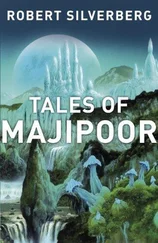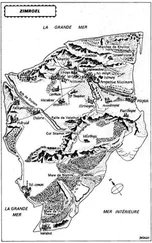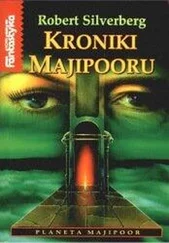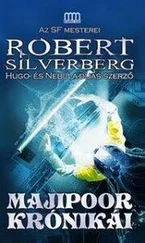Reports of the Pontifex’s critical condition had traveled all up and down the immensity of Majipoor, from city to city and shore to shore—from the Fifty Cities of Castle Mount throughout all of far-spreading Alhanroel, and across the Inner Sea to the Isle of Sleep from which the beloved Lady sent forth her soothing dreams, and farther west to the giant cities of the younger and wilder continent Zimroel, and downward into the torrid zone and the hot dry wastelands of the southern continent, Suvrael. The Pontifex is dying! The Pontifex is dying! And there was scarcely anyone, among all of Majipoor’s innumerable billions of people, who did not in some way feel uneasiness over the consequences of his death. For there was hardly anyone alive who was able to remember a time when Prankipin had not occupied one or the other of Majipoor’s two thrones; and who knew what would life be without him?
Indeed, fear was general in the land: fear of the dismantling of hierarchies, the disruption of order, the unleashing of chaos. It was so long since a change in the government had occurred that the people had forgotten how strong the bonds of tradition can be. Anything seemed possible once the old emperor was gone; they feared the worst, some dire transformation of the world that would engulf land and sea and farthest heaven.
An abundance of sorcerers and mages stood ready on all sides to guide them in this difficult moment. The time of the Pontifex Prankipin was a time when sorcery had flourished and proliferated luxuriantly on Majipoor.
No one could have expected, when the strapping young Duke Prankipin of Halanx became Coronal long ago, that ultimately he would cause the world to be inundated by a flood of wizardry and magic. The occult arts had always been a significant element in the life of Majipoor, most notably in the area of the interpretation of dreams. But until Prankipin’s time it was only the lower levels of society that had embraced such arcane disciplines as lay beyond simple dream-speaking that huge population of fishermen and weavers and gatherers of wood, of dyers and chariot-makers and potters and smiths, of sausage-sellers and barbers and slaughterers and acrobats and jugglers and boatmen and peddlers of dried sea-dragon meat, that formed the broad base of the giant planet’s bustling economy.
Curious cults had always thrived among such people—strange beliefs, often savage and violent, in powers and forces beyond the comprehension of ordinary mortals. The believers in these things had their prophets and their shamans, yes, and their amulets and their talismans, and their feasts and rituals and processions; and those who dwelled in the loftier regions of Majipoori life, the merchants and manufacturers and the members of the aristocracy above them, saw no serious harm in any of that. Perhaps, they said, there might even be some value in it for the poor folk who had faith in such things. On the other hand, very few of those more prosperous people tended to dabble themselves in what they regarded as the fantasies and superstitions of the lower classes.
But the Coronal Lord Prankipin’s enlightened trade policies had led Majipoor into a splendid golden age of economic expansion that brought widespread abundance of wealth at every level of society; and with increasing affluence often comes increased insecurity and fear of losing what one has attained. Such feelings frequently breed a longing for supernatural protection. The new wealth also brought an increase in self-indulgence, a hatred of boredom and a willingness, even an eagerness, to experiment with novel and remarkable things.
What had come to Majipoor also, with the access of this new prosperity, was not only greater credulity, but also a certain measure of greed, dishonesty, sloth, cruelty, debauchery, a love of wild excess and luxury, and other such vices for which the big planet had not been particularly known before. These things too created changes in Majipoori society.
So a fascination with the occult spread upward in Lord Prankipin’s time to the propertied classes, fostered by the multitudes of nonhuman Vroon and Su-Suheris folk, who arrived on Majipoor at this time—both of them much given to the practice of the mantic and prognostic arts. And through the devices and cunning of these sorcerers, people who were already eager for miracles were made to see not only the shape of things to come, but also a great host of wonders, gorgons and cockatrices, salamanders and winged serpents, feathered basilisks that spit hissing flame; and they were allowed to look through chasms of dark smoke and doors of white fire into universes beyond the universe, and the domains of all manner of gods and demigods and demons. Or so it seemed, to those who had faith in the evidence of what was before their eyes, though there were those skeptics that said it was all a fraud and a snare and a delusion. But the number of those sour cold-eyed onlookers grew ever fewer all the time.
Amulets and talismans were worn everywhere, and the scent of incense was ubiquitous in the land, and brisk trade was done in ointments with which to anoint doorposts and thresholds against the forces of evil. Also it became the fashion among certain of the newly rich to consult soothsayers concerning matters of business and investment, and then the more respectable of the new cults and mysteries received the approbation also of the educated and nobly born. The women of the aristocracy, and soon afterward the men as well, began to hire personal astrologers and seers; and ultimately Lord Prankipin himself gave his formal blessing to many of these exotic predilections by devoting more and more of his time to the company of mages, diviners, thaumaturges, and the like. His court came to have a full complement of sorcerers and wizards, whose wisdom was regularly employed in the course of governmental business.
By the time Lord Prankipin had moved on to the Labyrinth to assume the duties of Pontifex, and Confalume succeeded him as Coronal, these policies were too deeply entrenched for anyone, even the new Coronal, to speak out against them. Whether the new Lord Confalume maintained the occult disciplines in their supremacy at first out of inner conviction or mere shrewd tolerance of the status quo, was something that he had never revealed even to his closest advisers; but as the years passed he became as wholehearted an advocate of the wizardly philosophies as ever Prankipin had been. With Pontifex and Coronal united on this point, sorcery was a universal practice on Majipoor now.
And so, in this uncertain time, a good many practitioners of dark arts that once might have been deemed curious and strange indeed were available to offer strange and curious consolations to the millions—the billions—of frightened citizens whose souls were uneasy over what might be about to happen.
In Sisivondal, the busy mercantile center through which all the overland caravans of western Alhanroel passed on their way to the wealthy cities of Castle Mount, the Mystery of the Beholders was the rite by which the people hoped to hold back the dread demons that might burst loose at the hour of the Pontifex’s death.
No visitors came to Sisivondal for its beauty or its elegance. It was set in the midst of a bare featureless plain. One could set out from it and travel a thousand miles in any direction and see nothing but dry, dusty, flat lands. It was a flat dull city in the midst of a flat dull region, and its only distinction was that it was a place where a dozen major highways met.
Like the spokes of a giant wheel were the wide roads that crossed those dreary plains to intersect here, one coming in from the major port of Alaisor to the west, three running down from the north, three from the south, and no less than five connecting Sisivondal with mighty Castle Mount off in the distant east. The boulevards and avenues of Sisivondal were laid out as concentric circles that allowed easy connection from any of the incoming highways to any other. All along the streets that ran between the circular avenues were rows of flat-roofed nine-storied warehouses, each very much like its neighbor, in which goods destined for transshipment to other zones of the continent could temporarily be stored.
Читать дальше












